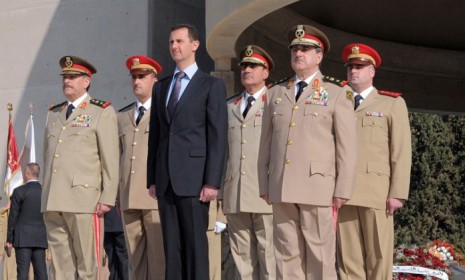Syria's devastating bombing: A turning point?
A blast kills several of the architects of President Bashar al-Assad's battle against the opposition. Is this the beginning of the end?

A free daily email with the biggest news stories of the day – and the best features from TheWeek.com
You are now subscribed
Your newsletter sign-up was successful
Syrian rebels dealt a stunning blow to President Bashar al-Assad on Wednesday with a brazen bombing that killed several of his top security aides, including his defense minister, Daoud Rajha, and his brother-in-law and key enforcer, Asef Shawkat. The attack weakened Assad's tight inner circle, and showed that the rebels can strike Assad's seat of power despite his military superiority. It came as fighting raged for a fourth day in the capital Damascus, at times within site of Assad's presidential palace. U.S. Defense Secretary Leon Panetta said that Syria "is rapidly spinning out of control." Has the opposition finally gained the upper hand 16 months after the uprising began? Here, a brief guide to the latest in the crisis:
Where did the bombing take place?
The blast tore apart a section of Syria's national security headquarters in Damascus. It hit during a meeting of the crisis group Assad formed to dispel the uprising. The British-based Syrian Observatory for Human Rights said every member of the security team was either killed or injured. The Syrian government did not confirm that report, but state-run media did confirm the deaths of Rajha and Shawkat. The news took Damascus residents by surprise, as the regime has deployed a huge security presence in the city to isolated pockets where rebel fighters have launched their recent offensive.
The Week
Escape your echo chamber. Get the facts behind the news, plus analysis from multiple perspectives.

Sign up for The Week's Free Newsletters
From our morning news briefing to a weekly Good News Newsletter, get the best of The Week delivered directly to your inbox.
From our morning news briefing to a weekly Good News Newsletter, get the best of The Week delivered directly to your inbox.
How did the rebels pull it off?
Government media blamed a suicide bomber, identified as one of Rajha's bodyguards. Leaders of the Free Syrian Army, who said it had carried out the attack, said they had arranged to have a bomb planted in the security headquarters, and detonated it by remote control. An Islamist group also claimed responsibility. No matter who did it, the attack was a good sign for the rebels. It's possible that "defectors or turncoats helped carry out an inside operation," says Neil MacFarquhar in The New York Times, which would suggest that Assad's support network is fraying. If nothing else, the bombing proved there are holes in the very security system that protects Assad himself.
Is this really going to weaken Assad?
Rahja was not a "true insider," says Mitchell Prochero at Foreign Policy, but as an Orthodox Christian he helped keep the country's Christian minority in support of Assad and his ruling Alawite minority. The real setback for Assad was Shawkat's death. The veteran intelligence hand, who was married to Assad's sister, Bushra, "was among the most trusted of his inner circle," says Rick Moran at The American Thinker. He was Assad's "front man" when Syria occupied neighboring Lebanon, and he was believed to have been involved in several high-level assassinations, including that of former Lebanese Prime Minister Rafiq Hariri. "His loss is a huge blow."
A free daily email with the biggest news stories of the day – and the best features from TheWeek.com
So was this was a turning point for the uprising?
This bombing "marks a new phase in the struggle for Syria's future," says Jonathan Marcus at BBC. The message is that Assad's security apparatus can't protect anyone anymore. Assad's Alawite core depends on cooperation from Christians and a security and business elite drawn from the Sunni Muslim majority, says Tony Karon at TIME. The bombing smashed the regime's aura of invincibility, which could worsen a recent wave of Sunni defections, and make it harder for Assad to hold it together. This might be the beginning of "Assad's death spiral," says Max Fisher at The Atlantic. But other dictators — in Algeria, Sri Lanka, and El Salvador, for example — have faced worse and survived. "Before we start counting Bashar al-Assad among the victims of the Arab Spring, we should count the dictators who have faced days like today and are still standing."
Sources: American Thinker, The Atlantic, BBC News, Foreign Policy, New York Times, TIME